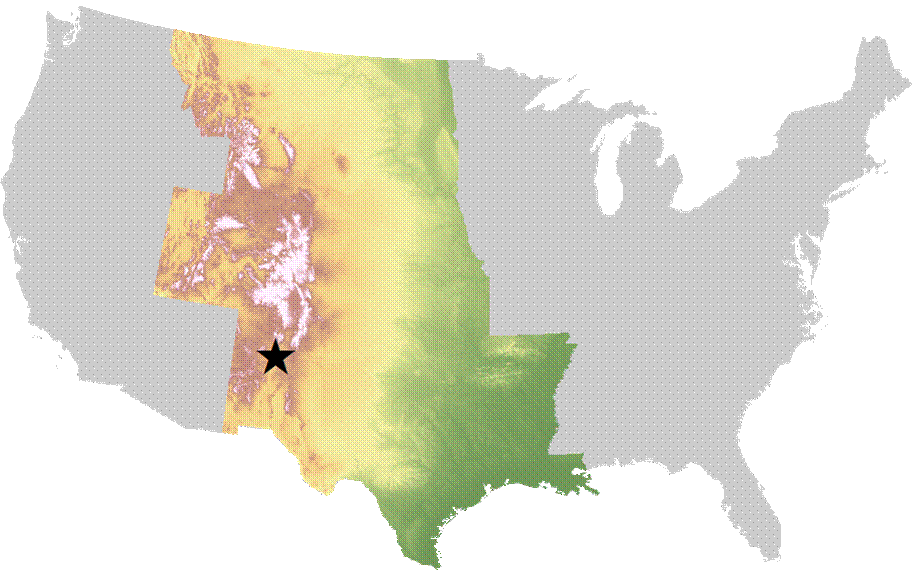Special Sessions
Opportunities exist for those interested in organizing special sessions at this year's joint regional meeting. Please make arrangements with the conference organizers. To participate in existing special sessions, presenters should contact the session organizers and, if approved, submit abstracts using the online submission system.
Graduate Program Information Session (GPIS)
Organized by Dr. Murray Rice (University of North Texas)
This year's joint regional meeting will include a session featuring the geography graduate programs in the SWAAG and GPRM regions. All graduate program representatives are invited to participate. The Graduate Program Information Session (GPIS) is organized to provide time for each participating program to briefly summarize their unique features. We also aim to provide some time for potential students to talk one-on-one with program representatives. In past SWAAG meetings, we have found the GPIS to be beneficial for both potential students and the participating programs. Due to the large number of programs in the two regions, an accurate count of participants is needed for scheduling purposes. If you would like to include your program in this year’s GPIS, or have questions about the session, please contact Murray Rice (rice@unt.edu).
Jobs in Geohumanities
Organized by Dr. Laurel C. Smith (University of Oklahoma) and Dr. Mona Domosh (Dartmouth University)
AAG Executive Director Douglas Richardson co-edited two books that were published by Routledge Press in 2011: Envisioning Landscapes, Making Worlds: Geography and the Humanities and GeoHumanities: Art, History, Text at the Edge of Place. Each of these collections feature essays that embody the sort of scholarship increasingly collected beneath the rubric of the geohumanities. As evident in the marvelous Book Review Symposium featured in the April 2013 issue of Progress in Human Geography, these books have generated rich dialogue. And they likely informed the AAG’s decision to create a third journal devoted to this field of inquiry.
Inspired by AAG President Mona Domosh’s Presidential Column in the July 2104 AAG Newsletter, “Strategic Essentialism and Radical Intra-Disciplinarity,” I wonder whether the moniker of geohumanities (or geoHumanities) provides an opportunity to defend and/or augment the work of humanities-oriented geographers? Could it offer leverage for creating research clusters and degree tracks? If so, we need to gird our loins for very pragmatic and often panicked conversations about jobs with students (and their parents).
Accordingly, this discussion panel considers the concerns about jobs that Robert Wilson raised in his commentary on Envisioning Landscapes, Making Worlds: Geography and the Humanities and GeoHumanities: Art, History, Text at the Edge of Place. These concerns range from academic positions in geography departments to career opportunities for undergraduate and graduate students pursuing geography degrees. Panel participants will draw on the Book Review Symposium, personal efforts, and institutional experiences to discuss these matters.
Land Change Science
Organized by the Landscape Land Use Change Institute, Dr. Kirsten de Beurs (The University of Oklahoma) and Dr. Jason Julian (Texas State University).
Complex problems associated with broad scale environmental issues cannot be addressed by individual scientific disciplines but instead should be tackled by a consortium of researchers from a variety of different fields. Land change science is one of these new interdisciplinary fields that have emerged as a fundamental component of global environmental change research. Land change science is broadly focused on observation, understanding, modeling, and assessing coupled human-environment systems in a spatial fashion. As we work to understand increasingly complex problems such as interactive effects among climate change, land use, and water resources, this need for truly interdisciplinary science will only increase. With this session, we aim to bring together the SWAAG and GPRM communities interested in land change science.
Law's Geographies
Organized by Dr. Melinda Harm Benson (University of New Mexico).
Legal geography is a growing new field that not only brings a geographic perspective to the applied, pragmatic practices of law but also provides a critical investigation into law’s spatialities. This session is a forum for a spectrum of legal geographies, both critical and applied. Papers will address issues related to what legal geography has to offer practice in the legal realm, and what legal research and activism have to offer geography as a discipline for a range of theoretical and methodological perspectives.
Spatial Thinking
Organized by Dr. Sarah Bednarz (Texas A&M University) and Dr. Robert Bednarz (Texas A&M University).
This session welcomes presentations concerning incorporating, applying, and encouraging spatial thinking in geography courses, supporting and highlighting spatial thinking through GIST, assessing spatial thinking skills, and teaching spatial thinking in geography departments. Presentations about pedagogical and theoretical aspects of spatial thinking are welcome.
U.S. Electoral Geography
Organized by Dr. Robert Watrel (South Dakota State University) and Dr. Fred Shelley (University of Oklahoma)
The purpose of this special session is to present material from the Atlas of the 2012 Elections, which is being published in late 2014 by Rowman and Littlefield. The session will include presentations by some of the contributors to the atlas, followed by a panel discussion led by those of the atlas' editors who will be in attendance at the conference. The panel discussion will focus not only on the atlas itself but also on the implications of the material in the atlas for the elections of 2014 and 2016.

